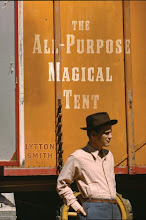You should check out the group blog In the Middle, which I hesitate to call a medieval blog, not because it isn't (well, it isn't being written in the medieval period, though for a medieval person currently blogging, see Geoffrey Chaucer Hath a Blog) but because it really troubles the line between ideas of the medieval as past/passed. Hence posts on Césaire, whose work I'm looking forward to looking more closely at, thanks to JJC's post.
Here, though, I'm beginning to answer a question he posed in the comments, wondering what turned me towards poetry.
Anyone ever play Dingbats? Or, as it might be known in the US, Whatzit, either known as the "game of batty wordplay" or the "board game of fractured phrases."
In the game, you're presented a card. On the card are letters arranged in ways that might look like gobbledegook, or might be recognizable words with letters spread about the card, or might resemble words you're familiar with but in strange combinations. You're meant to associated each arrangement of letters/words with a recognized idiom, "three blind mice," "make-up," "cash in hand" (this last would look like HACASHND). Some examples here.
As much as the idea is to "solve" the "puzzle," what these cards do is ask you to think about how language works, in relation to itself and to common idioms.
I played this game when I was knee high to a grasshopper, with my family, mainly when we were living in Germany during school holidays. To play a game that relies on an audience with shared expectations of recognized functions of language (idiom being a very idiosyncratic aspect of individual languages) when in a country which speaks a different language, merits further thought. Thinking back, though, I was less struck by this and more by the way words could be broken down, unexpectedly combined, rethought.
That, then, is a radical for poetry. It's particularly true of certain poets, (see my post on Saroyan below), but I don't mean to align the re-conception of language in Dingbats only with a poetry that gets defined as, and isolated as, "experimental." I remember being won over by Gabrielle Calvocoressi's debut collection, The Last Time I Saw Amelia Earhart by the line/stanza break
heads bent beside their husbands
come up from orange groves
just greening
That break seemed to refigure what language was drawing my attention to in the world, and how these lyric elements of husbands, orange groves, and ripening were combining together. One doesn't have to do what Saroyan does, or Susan Howe, or P. Inman in order to draw attention to language. Put somewhat essentially, I'm more interested in poetry which is conscious of language used in relational ways rather than referential ways (though can the two be so cleanly divorced?). That's part of what I understand from the phrase "the turn to language" which is used by Barrett Watten in Grand Piano Vol. 6; while it describes a particular moment associated with language-centered writing in the 1970s, Watten's interest in the turn to language by his collaborators is useful beyond that context. And so, while I think of some of the work of explicitly language-centered writing as exhibiting the properties I look for in a poem, that dingbat process, I think we can and should undergo such a process both when a poem visually disturbs our expectations and when it appears not to. It would, of course, be a mistake to remove from a poem the power to turn (us) to language. which is one danger of the sort of labeling of poetry schools that happens in contemporary poetry in some camps at the moment (but that's a topic for another post).
(It seems that Whatzit, at this website, has rechristened itself Dingbats, and is now messing around with images, too. Boo!).
And a Dingbat to leave you with:
B
A
B
E
L
(well, it seemed appropriate given the post...answer it in the comments)

2 comments:
La tour de Babel, je crois.
Great post ... and thanks for linking back to ITM.
Ah, indeed it is...though I love that you're answering in French. Perhaps what needs to happen is a multilingual Dingbats?
Post a Comment